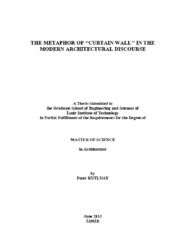Please use this identifier to cite or link to this item:
https://hdl.handle.net/11147/3613Full metadata record
| DC Field | Value | Language |
|---|---|---|
| dc.contributor.advisor | Yücel, Şebnem | en |
| dc.contributor.author | Kutluay, Pınar | - |
| dc.date.accessioned | 2014-07-22T13:51:56Z | - |
| dc.date.available | 2014-07-22T13:51:56Z | - |
| dc.date.issued | 2013 | en |
| dc.identifier.uri | http://hdl.handle.net/11147/3613 | - |
| dc.description | Thesis (Master)--İzmir Institute of Technology, Architecture, İzmir, 2013 | en |
| dc.description | Includes bibliographical references (leaves: 79-84) | en |
| dc.description | Text in English; Abstract: Turkish and English | en |
| dc.description | viii, 84 leaves | en |
| dc.description | Full text release delayed at author's request until 2016.07.16 | en |
| dc.description.abstract | "Curtain wall" is mostly regarded as a direct outcome of the industrial reform in the Nineteenth Century. Following technological determinist approach, most of the studies about curtain wall seek to find an origin for it in the late Nineteenth Century. Different from these studies, this thesis investigates the formation of the discourse of curtain wall in view of its metaphoric background. Instead of focusing only on technology as the main factor, the study unveils different sides of the discourse which remained in the background and deciphers how "curtain," a term borrowed from textile and theatre, has been associated with facade of frame structure. In detail, the study sheds light on how frame structure, one of the main components of a curtain wall system, came to be called as "skeleton" with reference to the theory of organicism. The dressing --Bekleidung-- theory of Gottfried Semper is also examined as an alternative interpretation of the relationship between structure and facade regarding monumentalization through dressing and masking; as skeleton structure led architects to reconsider wall with concern of representation. Furthermore, the study concentrates on the architectural environment of Chicago in the second half of the Nineteenth Century, exploring two mainly different interpretations of frame structure which both arose from a shared concern of representation by some significant architects, including Louis H. Sullivan, who was also interested in monumentalization through ornament. This thesis claims that curtain wall is a metaphor invented to reconcile the emerging technology with the theory of representation which had diverse sides. | en |
| dc.language.iso | en | en_US |
| dc.publisher | Izmir Institute of Technology | en_US |
| dc.rights | info:eu-repo/semantics/embargoedAccess | en_US |
| dc.subject.lcsh | Curtain walls | en |
| dc.subject.lcsh | Architecture, Modern--19th century | en |
| dc.title | The metaphor of "curtain wall" in the modern architectural discourse | en_US |
| dc.type | Master Thesis | en_US |
| dc.institutionauthor | Kutluay, Pınar | - |
| dc.department | Thesis (Master)--İzmir Institute of Technology, Architecture | en_US |
| dc.relation.publicationcategory | Tez | en_US |
| item.languageiso639-1 | en | - |
| item.fulltext | With Fulltext | - |
| item.openairecristype | http://purl.org/coar/resource_type/c_18cf | - |
| item.openairetype | Master Thesis | - |
| item.grantfulltext | open | - |
| item.cerifentitytype | Publications | - |
| Appears in Collections: | Master Degree / Yüksek Lisans Tezleri Sürdürülebilir Yeşil Kampüs Koleksiyonu / Sustainable Green Campus Collection | |
Files in This Item:
| File | Description | Size | Format | |
|---|---|---|---|---|
| 10008005.pdf | MasterThesis | 8.61 MB | Adobe PDF |  View/Open |
CORE Recommender
Page view(s)
136
checked on Jul 22, 2024
Download(s)
466
checked on Jul 22, 2024
Google ScholarTM
Check
Items in GCRIS Repository are protected by copyright, with all rights reserved, unless otherwise indicated.